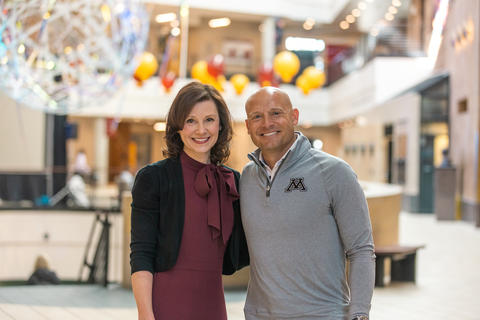
Fleck Teaches Leadership Moment By Moment
Monday, February 20, 2023
Leadership, according to Gophers football head coach P.J. Fleck, is fragile.
“It takes years, just like trust, to build something,” Fleck says. “And it only takes one thing to destroy it.”
To demonstrate this, Fleck stands in front of a classroom in the basement of the Carlson School holding with a large, maroon vase. It’s an heirloom, he says, that’s been in his wife’s family for 150 years. The vase is fragile, like leadership, and with one bad decision, it can be broken, he explains to the class.
It’s at that moment that Fleck lets go of the vase, sending it hurtling to the ground. It shatters into dozens of pieces.
The class is shocked.
“That is not [my wife] Heather’s vase. … It was from Target,” he says.
The experience, atypical for most college instructors, is pure Fleck. He is a co-instructor for a seven-week course for Carlson School undergraduates.
Fleck, alongside Carlson School Professor Theresa Glomb, is co-teaching MGMT 3061: Leadership in Practice: Everyday Moments of Leadership. The class is designed for students to develop their leadership skills and teach how there are opportunities every day, whether it’s a big or small moment, to be a leader.
Glomb, the Toro Company-David M. Lilly Chair in Organizational Behavior and academic director of the Undergraduate Program’s Leadership Lab, which is designed for students to develop their leadership skills through a co-curricular program that blends academic coursework with experiences designed to challenge students, expose them to new ideas, and reinforce approaches that drive change.
She reached out to the athletics department to see what a partnership between the Carlson School’s leadership program and athletics might look like. She had recently read Fleck’s memoir, “Row The Boat,” which shares principles and lessons from Fleck’s experiences building winning teams and programs, and immediately started to think about how it might work in the classroom.
“The principles around leadership transcend the content,” Glomb says. “When I read P.J.’s book, I thought, ‘This completely aligns with the leadership principles we’re trying to teach the students.’”
Fleck, who graduated from Northern Illinois University with a degree in elementary education, is a natural in the classroom. On this day, he uses a UFC fight as an example of not being afraid to fail and shares how he sets goals and expectations for his staff and players for the upcoming year, all while bringing the same energy he brings to the sidelines on fall Saturdays.
Running a Big Ten football program is not unlike running a business. He hires a staff, manages a budget, maintains relationships with donors, reports to administrators, and has to motivate a team to get the best results.
“It doesn’t matter that it’s football,” Glomb says. “The same principles and the same behaviors can be applied. The way I like to think about the class is that he’s bringing the concepts we talk about to life.”
Fleck and Glomb both hope to continue this partnership in years going forward. The experience for the students has been invaluable, Glomb says.
“One of the things about P.J. that I love is that he’s such an intentional leader,” Glomb says. “People know the expectations, and they understand his vision. There is no question. That is the kind of leadership I want the students to think about. What are your values and how are you living those values?”
On the way out of the classroom, students are asked to grab a piece of the broken vase. Some students stop to take pictures with Fleck and have him autograph their piece of the vase.
Fleck tells the class that he hopes at some point down the line the vase is on their desk and they think back to the lesson that day.
“I want you to put that somewhere to know how fragile leadership is,” he says. “If you come to my office, it’s like a classroom. It’s not like a modern wall-of-windows office with nothing on my desk. It’s a mess. But it’s an organized mess full of stories of everything that has reminded me of something that I’ve done right and something that I’ve done wrong—one memory that’s made me think completely different than I used to.”
